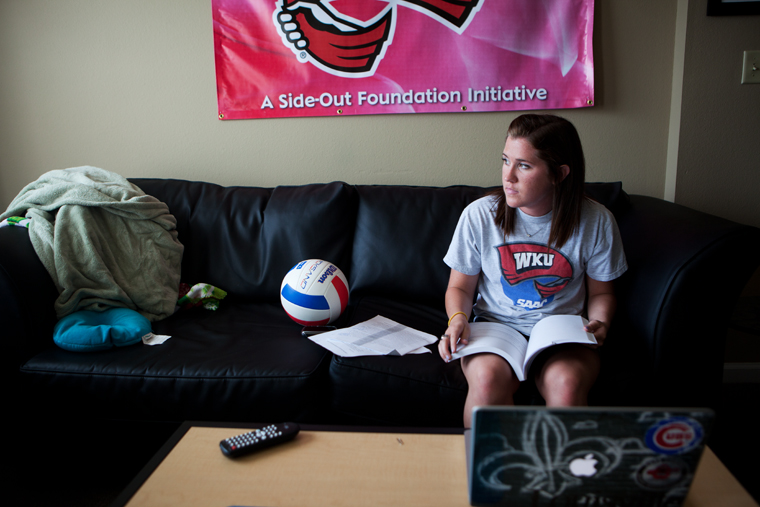Former WKU student athletes deal with life after sports
March 22, 2011
After a career beginning with T-ball and ending with four years as starting first baseman at WKU, Shannon Smith had to say goodbye.
The farewell was neither by choice nor injury, instead because of a fate that nearly 360,000 other NCAA athletes have to face annually.
When the final pitch was thrown in the Sun Belt Conference softball tournament last May, Smith had exhausted her eligibility in the sport.
“I was so ready to be done with it, but when it finally was done, I was like, ‘Oh gosh, what do I do now?’” Smith said. “It’s been such a big part of my life for so long. I couldn’t go on without having it in my life.”
Smith, an accounting major who graduated in December 2010, had a career waiting for her with Ernst & Young in Nashville before she was a junior at WKU.
But the 22-year-old said going from student athlete to full-time employee hasn’t been easy.
“I know a lot of my teammates are really struggling right now,” Smith said. “They are having trouble finding jobs right now, and they are so lost. I really miss it, but I was lucky having a job coming out of college. It’s a big transition.”
Smith now lives in Goodlettsville, Tenn., and commutes through Nashville traffic to work each morning.
Because the softball team plays more than 60 games in a typical season, Smith said her new lifestyle is really not that much different.
“All the adversity I faced in the sport especially prepared me for accounting and the pressure I’m feeling with it right now with the busy season of taxes,” she said. “The waking up early and then staying late doesn’t have the same effect on me as much as it does the other new hires.”
Since ending her sports career at WKU, Smith has joined a slow-pitch softball team in Bowling Green and plans to start a league at Ernst & Young.
“I still can’t get away from it,” she said.
Smith’s former teammate, Lindsay Antone, 23, has also had trouble escaping the sport since graduating from WKU in May.
To help with her adjustment, Antone joined a slow-pitch league and continues to work out regularly.
Antone, who manages the Bowling Green Athletic Club, a local gym, said she has struggled since her playing days ended.
“It was kind of my identity for so long, and now I don’t have that anymore,” Antone said. “It is like I’m figuring out the other things I’m good at besides softball right now.
“It’s bittersweet, you know?”
The same is true for Patrick Jenkins, who graduated from WKU in May 2010 after competing four years for the track and cross country programs.
As a pre-med student, Jenkins said studying often trumped running because he knew he “wasn’t going to be a professional athlete.”
“I had to keep that thought in perspective whenever it came down to, ‘Do I run this race or do I study for this test?’” Jenkins said.
The 22-year-old graduated from WKU with a 4.0 GPA and is now enrolled in medical school at the University of Kentucky.
“I didn’t want to look back on my time at Western and regret anything,” Jenkins said. “But I didn’t want to be so caught up in it that I couldn’t move on. I wanted to be able to adapt.”
But to senior defensive specialist Kelly Potts, who redshirted in volleyball her freshman year and then played the next four, the sport has defined who she is as a person.
Potts began playing volleyball at the age of seven with her younger sister, Ashley. The two both became starters for WKU.
Although Potts, 23, will graduate with a marketing degree in May, her volleyball career ended in December 2010.
“I don’t know what life is without sports,” Potts said. “I’m just now getting into that. Some people do sororities while they are here, some people do other organizations. I did volleyball.”
Potts said she is just now beginning to look back at the life she is learning to leave behind.
As she reflects, the senior said doesn’t regret focusing so much of her time and energy on a sport she knew she wouldn’t go on to play professionally.
“When I came to Western, I was a completely different person,” Potts said. “I didn’t talk. I didn’t socialize. I questioned myself all the time. I was not a leader at all.
“Through these five years being in the setting of collegiate volleyball, it has completely reshaped me for the better.”













